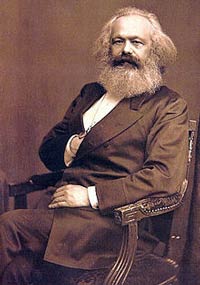
| Born: May 5, 1818 in Trier, Kingdom of Prussia, German Confederation |
| Died: Mar 14, 1883 (at age 64) in London, United Kingdom |
| Nationality: German |
| Fields: Philosophy, Economics, Sociology, history, journalism |
| Famous For: Theories of capitalism and economics |
Karl Marx (1818-1883) was a German philosopher, economist, and a revolutionist. His writings form the main basis of the body of ideas known as Marxism. Along with his friend, Friedrich Engels, Mark created the theory of modern communalism and socialism.
Early Life of Karl Marx
Karl Marx was born in Trier, Germany, in 1818. His father, Hirschel Marx, was a lawyer who decided to abandon his Jewish faith to escape anti-Semitism. Although the majority of the people living in Trier were Catholics, Hirschel Marx changed his name to Heinrich and became a protestant Christian.
Marx’s Education
Marx was an average student during his school days. Until the age of 12, he was taught at home and from 1830 to 1835, he did his schooling at Jesuit High School in Trier. Following his graduation, Karl Marx entered Bonn University to study law. At the college, Marx spent most of his time socializing with people and had accrued huge debts. His father agreed to clear his debts, but insisted that he enroll in Berlin University.
During his period at Berlin University, Marx found a great change in his career. He worked hard and studied well. He was influenced by one of his teachers – Bruno Brier – whose radical political opinions and atheism got him into trouble. He was also introduced to the philosophy of G.W.F Hegel, the late Berlin professor, and joined a group called Young Hegelians.
Marx’s Early Career
These young Hegelians were challenging all existing institutions as well as their ideas such as politics, ethics, philosophy and religion. In 1938, Heinrich Marx died which made Karl Marx have to earn his own living. He decided to become a lecturer in the university and expected his mentor, Bruno Bauer, to help him get the job. However, Bauer was unable to help him get a job because he was fired as a result of his outspoken atheistic viewpoints.
Marx then began working as a journalist. In 1842, he became the editor of a newspaper in Cologne. Since the government ordered the suppression of the newspaper in1843, Marx resigned his job and moved to Paris.
Marx in Paris
In Paris, Marx and Ruge founded a political journal, but it was brought to a halt when the two had some major differences in opinion. In 1844, however, the journal brought Friedrich Engels to Marx, who then became his collaborator and lifelong friend.
Marx in Brussels
Moses Hess introduced Marx to socialism, and thus his ideology on Hegelians was broken completely. During this period, Marx wrote about historical materialism in a work entitled The German Ideology and also in Theses on Feuerbach. However, both of these publications were never published until after his death.
By 1844, Karl Marx was a convinced communist. In 1847, he was asked to write a statement of principles by the communist league. Marx concentrated on writing, The Communist Manifesto and published it in 1848. The next month, following the work’s publishing, Marx got expelled from Belgium and went to France, and then to London.
Marx in London
After moving to England, Marx started elaborating on his ideas and published his first book – Das Kapital – in 1867. The other volumes were also published in the following years by Engels which helped Marx become financially secure.
Soon after, Marx began to suffer from ill health. He died on March 14, 1883, and is buried in Highgate Cemetery